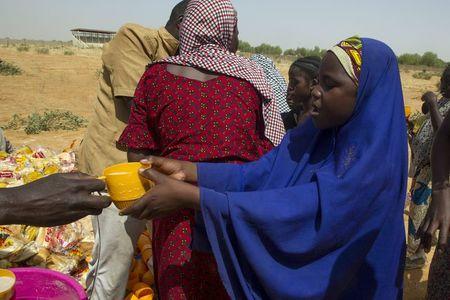Advertisement
Boko Haram crisis pushes poor of western Chad to brink of hunger, says UNICEF
LONDON (Reuters) - Under the shade of a wooden shack in the western Chadian town of Bagasola, heavily pregnant Zara Gayi sells mangoes and vegetables, hoping to earn enough money to feed her four children. On a good day she can make three dollars.
"My husband used to ride boats to Nigeria. Since the border closure months ago, he cannot work anymore. In the past, he could earn 100,000 Naira ($500) a month," she told the United Nations children's agency UNICEF.
Disruptions to trade and an influx of refugees fleeing Boko Haram attacks in Nigeria have made life more difficult for people already struggling with a poor harvest in western Chad.
Since January, an estimated 18,000 Nigerian refugees and 8,500 Chadian returnees arrived in Chad, fleeing an insurgency by the Islamist militant group in northern Nigeria, according to UNICEF.
In six months the number of people living in "food insecurity" - without reliable access to enough affordable food - in Kanem, Barh El Gazal and Lake regions of western Chad has increased to 552,000 from 339,000, said UNICEF, citing World Food Programme (WFP) figures.
The region depends on trade with Nigeria, but with damage to infrastructure, a fall off in cross-border trade and continuing insecurity, markets for cattle and farm produce are shut down.
Poor rainfall, which disrupted last year's harvest, has added additional pressure, increasing prices for basic goods and reducing stocks.
"Last year we harvested only one hundred kilos of millet covering only three months of our needs. We cannot afford to buy much in the market, cereals are too expensive," Khadidja Adoum, who is struggling to feed her four children, told UNICEF.
Two of Adoum's children, who are severely malnourished, were admitted to a health facility for the fourth time this year, UNICEF said in a report from the region.
"This humanitarian crisis is another shock for Chad in one of the most fragile regions of the Sahel belt," Bruno Maes, UNICEF representative in Chad, said in a statement.
"The needs will increase in the coming weeks and months with the lean season and the persistent insecurity in Nigeria. The shortage of funding available is putting under strain our ability to provide life-saving assistance."
Boko Haram fighters seized control of a swathe of northeast Nigeria last year, killing thousands in an unprecedented land grab while increasing incursions on neighbouring countries.
Though a military campaign by Nigeria backed by its neighbours Chad, Niger and Cameroon has driven Boko Haram out of many positions it previously held, the U.N. still expects refugee numbers to rise.
(Reporting By Magdalena Mis; Editing by Ros Russell)



















Add new comment